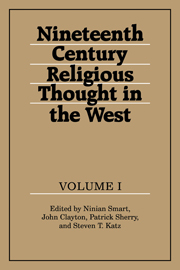5 - ARTHUR SCHOPENHAUER
Published online by Cambridge University Press: 05 August 2016
Summary
Arthur Schopenhauer, in spite of his considerable and lasting influence outside of philosophy, particularly in literature and the arts, has not had a comparable influence on religious thought. This is not because his philosophy is not a rich and even inspiring source of themes that are of significance to a religious interpretation of life. Rather, it is because of the pessimism that pervades his writing, together with his own unsparing hostility to popular religion, which he thought of as a spurious kind of metaphysics. His attitude towards the Gospels, and the spirit of unselfish love that is found in them, was reverential. And he was, more than any other western philosopher of importance, profoundly influenced by the religions of the East, particularly by Buddhist and Hindu thought. In fact, he thought he found there the confirmation of his own philosophy, the main features of which he had worked out before becoming aware of these sources. Whether this is so or not, there is no doubt that his philosophy is of deep significance to religion, and that his pessimism, properly understood, does not in any way detract from that significance.
A brief biography
Schopenhauer was born in what was then the free city of Danzig, on 22 February 1788, and died in Frankfort on 21 September 1860. He was the son of a prosperous merchant, Heinrich Floris Schopenhauer, and the former Johanna Henriette Trosiener, a woman of considerable style who was well known during her lifetime as a novelist. Most of his youth was spent in Hamburg, however, where he soon manifested an interest in books and a corresponding disdain for business.
- Type
- Chapter
- Information
- Nineteenth-Century Religious Thought in the West , pp. 157 - 180Publisher: Cambridge University PressPrint publication year: 1985



